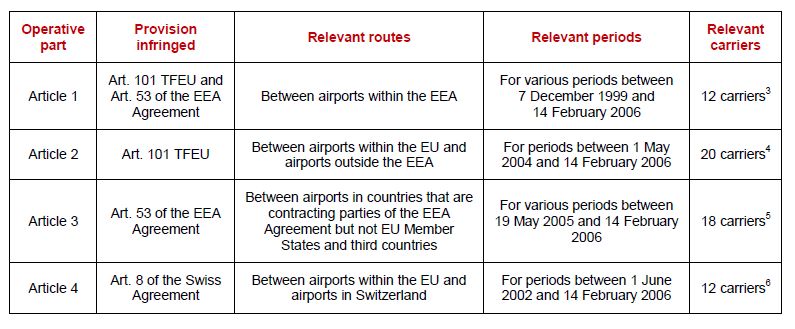The General Court annulled the airfreight decision adopted in November 2010 by which the European Commission fined a number of air freight carriers EUR 799 million for a price fixing cartel. According to the Court, the grounds of the decision and the operative part of the decision were contradictory.
Background to the Dispute
In November 2010, the Commission found that 21 air freight carriers infringed EU antitrust rules by coordinating their behavior in regard to surcharges for fuel and security, both of which determine pricing of freight services, on routes between the EU/EEA and airports in third countries for various periods. The Commission imposed fines totalling EUR 799 million.
With the exception of Qantas Airways, the carriers challenged the Commission decision before the General1 Court. The judgments, which were handed down on 16 December 2015, are largely identical as the General Court annulled the Commission decision for the same reason in respect of each applicant.
Contradiction Between the Grounds of the Contested Decision and its Operative Part
The carriers each contended that there had been a failure to state reasons, as there was a contradiction2 between the grounds of the contested decision and its operative part. They submitted that, as a result, the decision had to be annulled. More specifically, the carriers argued that in the grounds of the decision the Commission described one single and continuous infringement, whereas the operative part of the contested decision found four separate infringements based on different routes and different periods, which involved different carriers.
Before examining whether there was indeed a contradiction between the grounds and the operative part of the decision, the General Court first set out a number of general principles. It noted in particular that:
- An inadequate statement of reasons constitutes an infringement of essential procedural requirements;
- A statement of reasons must disclose in a clear and unequivocal fashion the reasoning followed by the Commission in such a way as to make the addressee of the decision aware of the reasons for the sanction, and thus enable him to defend its rights on appeal; and
- Clear wording of the operative part of a decision finding an infringement must also allow national judges to understand the scope of the infringement and to identify the infringing companies in order to be able to draw the necessary inferences in regard to claims for damages.
Articles 1 to 4 of the operative part of the contested decision can be summarized as follows:

The Commission argued that this division reflected the complexity of the case, as the single and continuous infringement described in its decision infringed three different legal provisions and concerned different territorial and temporal scopes.
Infringement of Essential Procedural Requirements
The General Court concluded that there was a contradiction between the grounds of the contested decision and its operative part which constituted an infringement of essential procedural requirements. According to the grounds of the contested decision, all of the 21 carriers mentioned in the Commission decision participated in the anticompetitive conduct comprising the single and continuous worldwide infringement,
irrespective of the route operated. Yet, only 11 of the 21 carriers are mentioned in each of the four Articles of the operative part; the others are mentioned in some, but not all of the first four Articles.
The General Court held that this fact was difficult to reconcile with the Commission's finding set out in the grounds of the contested decision of a single and continuous infringement.
The General Court stressed that to establish liability vis-à-vis a company for participation in a single and continuous infringement, the Commission must show that the company intended to contribute by its own conduct to the common objectives pursued by all the participants and that it was aware of the unlawful conduct planned or put into effect by other companies in pursuit of the same objectives or that it could reasonably have foreseen it and that it was prepared to take the risk.
Applying this principle to the contested decision, the General Court stated that if the anticompetitive conduct was regarded as comprising a single and continuous infringement of Article 101 TFEU, Article 53 EEA Agreement and Article 8 of the Swiss Agreement, concerning all routes by the cartel, and in which all of the carriers at issue participated, the carriers mentioned in Article 2 should also be included in Articles 1 and 4 of the operative part.
Moreover, all of the carriers which, according to Article 2, participated in the conduct referred to in that article for a period that extended beyond 19 May 2005 should also be included in Article 3 of the operative part.
The General Court therefore concluded that the first four Articles of the operative part cannot be interpreted as supporting the Commission's findings of a single and continuous infringement in relation to all the routes covered by the cartel and in which all the carriers covered by the Commission decision participated. Rather, as several carriers are mentioned in some but not all four Articles, the first four Articles of the operative part must be interpreted as meaning either:
- That the operative part finds four separate single and continuous infringements, each concerning a different category of routes, which might also explain the use of the word "infringements" in the plural, in Articles 5 and 6; or
- That the operative part finds one single and continuous infringement, liability of which is attributed only to the carriers which—in regard to the routes mentioned in each of the four Articles of the operative part— participated directly in the unlawful conduct referred to in each of those Articles or were aware of collusion regarding those routes and accepted the risk.
Finally, the General Court also noted that the grounds of the contested decision themselves were not entirely internally consistent.
Infringement of the Applicants' Right of Defense
Under European law, the mere existence of contradiction is not sufficient to establish that the decision is vitiated by a defective statement of reasons resulting in the infringement of the applicant's right of defense, provided that:
- The decision, taken as a whole, is such that the applicant is able to identify and plead that lack of consistency;
- The wording of the operative part of the decision is sufficiently clear and precise to allow the applicant to ascertain the exact scope of the decision; and
- The evidence relied upon to demonstrate the applicant's participation in the infringements imputed to it in the operative part is clearly identified and examined in the grounds.
In that regard, the General Court noted that neither of the two possible interpretations of the operative part of the contested decision described above was consistent with the grounds of the decision. As a result, since the General Court could not favor one of those interpretations without submitting its own assessment for that of the Commission, it examined, in the context of at least one of those two possible interpretations, whether the internal inconsistencies in the contested decision were liable to infringe the applicant's rights of defense and prevent the Court from exercising its power of review.
In regard to the first interpretation (namely that the operative part of the contested decision finds four separate single and continuous infringements), the General Court observed that:
- The applicant was able to identify a contradiction but was not in a position to understand to what extent the evidence set out in the grounds of the contested decision, relating to the existence of a single and continuous infringement, was liable to establish the existence of four separate infringements found in the operative part, as the Commission did not treat the evidence adduced in regard to each of the carriers differently depending on the routes or categories of routes to which that evidence related;
- The applicant was also unable to understand the line of reasoning that led the Commission to find the applicant liable for an infringement, including in respect of routes which it did not operate within the parameters defined by each article of the contested decision, and, accordingly, to understand whether it had been treated unfairly by comparison with the carriers at issue which were held liable for only two infringements, or even just one, on the ground that they did not operate certain routes.
Moreover, it was not clear from a reading of the contested decision why certain carriers were not included in some Articles of the contested decision.
The General Court also held that it was unable to review the legality of the contested decision, since it was not in a position to assess whether the evidence adduced by the Commission in order to establish the existence of a single and continuous infringement was sufficient to establish the existence of the four infringements found in the operative part of that decision.
The General Court concluded that the contested decision was vitiated by a defective statement of reasons and therefore annulled the decision insofar as it concerned each of the applicants. In each case the Commission was ordered to pay its own costs. The Commission was also ordered to pay the costs of all the applicants.
Major Takeaways
Throughout the world, antitrust enforcement authorities imposed fines on a number of airlines for the alleged global airfreight cartel.
The General Court's ruling is a victory for the air freight carriers that appealed the contested decision. Indeed, the General Court rarely annuls Commission antitrust decisions in their entirety.
While the broader effects of the ruling are still being examined, what is clear at the present stage is that:
- The European Commission may request the Court of Justice to set aside the General Court's ruling;
- Alternatively, or in addition, the Commission could re-adopt its decision and re-impose fines on the various carriers; and
- Qantas did not appeal the Commission decision, which therefore remains valid as far as it is concerned.
This will raise even more issues were the Commission to re-adopt a decision. The ruling may also have an impact on a number of damages actions that have been brought based, at least in part, on the Commission decision before various national courts of the EU Member States.
Footnotes
1 Judgments in Cases T-9/11 Air Canada, T-28/11 Koninklijke Luchtvaart Maatschappij, T-36/11 Japan Airlines, T-38/11 Cathay Pacific Airways, T-39/11 Cargolux Airlines International, T-40/11 Latam Airlines Group and Others, T-43/11 Singapore Airlines and Others, T-46/11 Deutsche Lufthansa and Others, T-48/11 British Airways, T-56/11 SAS Cargo Group and Others, T-62/11 Air France-KLM, T-63/11 Société Air France and T-67/11 Martinair Holland v Commission. Shearman & Sterling represented Cargolux Airlines International in its appeal against the Commission decision. Members of the Global Antitrust Group previously represented United Airlines, which were dropped from the investigation prior to the Commission adopting a decision.
2 The General Court raised this point in the context of the measures of organisation of procedure provided for in Article 64 of its Rules of Procedure of 2 May 1991, by putting written questions to the parties in the appeals.
3 Air France-KLM, Air France, KLM, British Airways, Cargolux, Lufthansa Cargo, Lufthansa, Swiss, Martinair, SAS, SAS Cargo, Scandinavian Airlines.
4 Air Canada, Air France-KLM, Air France, KLM, British Airways, Cargolux, Cathay, Japan Airlines Corp., Japan Airlines International, LAN, LAN Cargo, Lufthansa Cargo, Lufthansa, Swiss, Martinair, Qantas, SAS, SAS Cargo, Singapore Airlines Cargo, Singapore Airlines.
5 Air Canada, Air France-KLM, Air France, KLM, British Airways, Cargolux, Cathay, Japan Airlines Corp., Japan Airlines International, Lufthansa Cargo, Lufthansa, Swiss, Martinair, Qantas, SAS, SAS Cargo, Singapore Airlines Cargo, Singapore Airlines.
6 Air France-KLM, Air France, KLM, British Airways, Cargolux, Lufthansa Cargo, Lufthansa, Swiss, Martinair, SAS, SAS Cargo, Scandinavian Airlines System.
The content of this article is intended to provide a general guide to the subject matter. Specialist advice should be sought about your specific circumstances.



